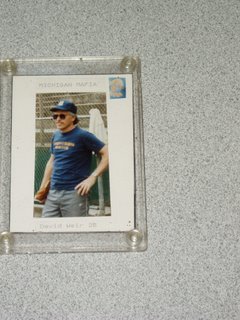Not me, I'm not off to anywhere yet, but my car is. Peter and I switched, so I drove his older model down 101 South today. You never know what you'll encounter on this commute; today it was a runaway box of empty styrofoam food containers that was rapidly transformed into a cloud of snowy pollution that drifted far southward from where the box lay wounded on its side in South city.
It is an odd car that I am driving today; it moans, emitting a kind of long, sorrowful groan, otherwise unintelligible. Naturally, I tried talking to it, asking about its history, but it did not answer.
Oliver doesn't talk much either; he's come back now and then to enjoy the sun in my back yard. He sits next to me when I grill and sniffs the steaks, or whatever, with vague interest. I wonder what will happen when I grill fish, however. That may get him jumping.
He's a lethargic fellow, but slender and healthy, just a peaceable sort, uninterested in fights or challenges. When we first locked eyes, he rolled over on his belly to indicate he prefers to
make love not war.
Lots of history with cats and me. My older kids had a cat named Choicey who lived maybe 19 years; she was very sweet when young and crotchety when old. Most of her life she was in extraordinary shape, very healthy and quite aggressive as a hunter. She used to wait near the fruit trees in our yard after harvest when the only plums, apples, apricots, left on the branches were rotting.
Birds would come by and peck at this fermented fruit and then fly away erratically, drunk. Choicey specialized in vertical leaps timed perfectly to allow her to pluck these careless alcoholics out of mid-air, very impressive. She reminds me, in memory, of Omar Vizquel snatching a line drive out headed for left field of the air...
Choicey was equally good at catching small snakes, injuring them slightly, and bringing them to the front door triumphantly (never inside). Peter always carefully addressed the snake's injury and nursed it back to health in an aquarium, filled not with water but a little soil and lots of grasses (and bugs to eat). When the snake was healthy, he released it back to the yard.
Unlike the snakes, few of the birds brought down by Choicey survived. Darwinian drama in a front yard.
***
Aidan found an abandoned nest of kittens in Golden Gate Park during a school picnic about five years ago. That is when we got Ghoastie, one of our two current cats (the other being Pumpkin, both females.) Ghoastie is slim, active, outdoorsy and submissive; Pumpkin rules the house and loves to sleep on the couch or on Julia's bed.
When the kids' Mom and I split up, in 2003, there was a period of time that both cats stayed with me in my flat, until the previous owner could vacate the new house we bought. One night, Ghoastie escaped out back and disappeared. The children were back east (as they are now) visiting their grandparents, so I didn't tell them at first, hoping she would turn up before they came home.
She didn't. She remained missing for weeks. The kids and I created a poster, which we circulated to every neighbor along both sides of four streets. Hundreds of posters like the ones you see all the time, tacked to telephone calls, or slipped under your front door.
Then, one night, my girlfriend and I were out back when we heard a distant "Meow." She had just been explaining to me how cats talk in Mandarin, which appeared to quite different from our American felines. At the sound of this faint cat cry, we both rushed to the back fence. I called Ghoastie in English, she called out in Chinese. (We reasoned that you can never know too many languages when it comes to attracting a runaway cat.)
Slowly, for more than an hour, the cat's cries became progressively closer. She was far away at first, probably five or six backyards away in the darkness. But finally, she sounded as if she were next door. We kept calling and waiting. Suddenly, up and over the fence came Ghoastie. She nuzzled into my girlfriend's arms, which settled our linguistic debate once and for all.
***
Earlier, my younger kids had a cat named Jazz. He had been rescued by a friend who found him huddled inside a bulldozer that was parked near a wetlands reclamation project in Marin. My wife took Jazz in, fed him from a bottle, and nursed him back from a fragile state. The vet said it would be touch and go whether he survived, but he did.
When we moved cross-country in the middle of 1999, we left Jazz with a neighbor. He had always been an outside cat, very friendly, pretty territorial, but nice with the kids. The neighbor loved him and tried to make sure he was safe, but one day in her back yard he got into a fight with another male cat, who bit him.
After that, he refused to go outside. He retreated into a front room, and sat in a window looking out toward where we used to live. She could not coax him out, so she moved his food, water and litter box into the room and let him be.
A few weeks later, when I returned to the west coast to retrieve a few possessions, including Jazz, he perked up immediately when I approached the neighbor’s house, and once I was inside, he rushed out of the room, and very happily entered the airline carrying case I had brought for him. (This in and of itself was odd, because he had always before fought going inside the case.)
Back in Takoma Park, outside D.C., he settled into our big house, and explored the yards. But soon, he stopped going outside, which was puzzling. Over the months, he gained weight and became less and less active. We only realized something was terribly wrong when he started spending all day and all night on one corner of baby Julia's changing table, the corner nearest a window that looked out over our vast back yard.
The vet said he was dying from feline leukemia, which is rampant in San Francisco. He probably got it from the bite in the fight. He never cried or complained; he just gazed at a place way out in the garden where he once had roamed.
After he died, I buried Jazz in the exact spot way back in the yard he'd spent his final days gazing at.
***
I love Google's translation service; when I asked it to translate Burning Man into Japanese it came out as above (in the title field); and when I retranslated that back to English, it came out as: "In from the very hot person separated."
The same English to Spanish to English process yielded "Ardent Man."
 "And why do you have so many pencils?"
"And why do you have so many pencils?"


